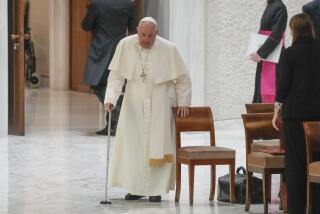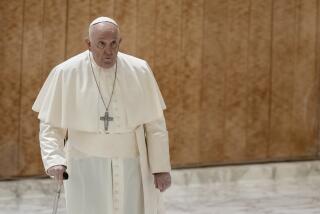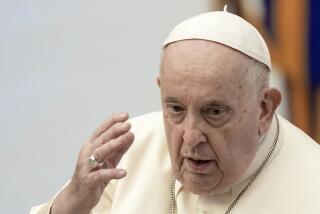Pope Francis has only one lung. Is it enough?
His predecessor was the first pope to retire due to deteriorating health -- a condition no doubt exacerbated by frequent world travel and a demanding schedule.
Yet at age 76, Pope Francis arrives at the Vatican with his own medical history. Specifically, the new leader of the Catholic Church had one of his lungs removed as a teen, likely due to an infection.
We asked two medical experts whether such a condition was likely to hamper the new pope’s ability to manage one of the world’s largest nonprofit organizations. The answer: probably not, as long as he can guard against a serious case of pneumonia or influenza.
“People who have spent their entire life living with one lung, usually accommodate to it extremely well,” said Dr. Richard Shemin, chief of cardiac and thoracic surgery at Ronald Reagan UCLA Medical Center. “That’s assuming they don’t smoke and do everything they can to not have environmental factors destroy their good lung.”
Today, the primary cause of lung removal is lung cancer. Decades ago, however, prior to the availability of powerful antibiotics, lung removal would have been a radical way of treating infection brought on by severe tuberculosis or pneumonia.
Shemin said that in cases in which a lung has been removed, the internal space that’s created causes other organs to occupy part of that space, and in the process, increases the function of the residual lung.
“Two lungs are not required for life,” Shemin said.
Lung function is measured by the amount of air a person can expel from their lungs in one second.
Healthy individuals with two lungs will blow out roughly 4 liters of air. A healthy person with one lung will blow between 2.5 and 2.75 liters, according to Dr. John Belperio, a professor of pulmonary and critical care at the David Geffen School of Medicine at UCLA.
Belperio said that even individuals who blow out just 1.5 liters of air can sustain life for a long time.
“People can live off of one lung and typically it does not impair a person’s life, really, in any way,” Belperio said. “They live essentially as long as a normal person would live. Typically, they can exercise, depending on their conditioning, pretty similar to a normal person. So they don’t really have any true physical limitations.”
Even with a demanding schedule and frequent travel, a single lung is unlikely to limit a person’s ability to work, experts said. In Francis’ case, the greater risk, according to doctors, is the chance that the pope would contract a serious case of pneumonia or the flu.
“He’s not going to have as much reserve lung capacity as someone with two lungs,” Belperio said. “Compared with someone who has 100% lung function, he’s going to have 60% to 70%. It puts him at a little bit of a disadvantage, but not much.”
Both doctors noted that the fact that the pope has made it to age 76 suggests that his remaining lung is functioning extremely well. They also surmised that his attending physician would be very aggressive in treating respiratory conditions.
“He’s the pope,” Belperio said. “If he starts coughing at all he’s going to get a quick chest X-ray. If he were to get a little infection, they’re going to be on top of it very quickly. I would think his life expectancy, from a one-lung standpoint is no different than someone with two lungs.”
Return to Booster Shots blog.
twitter.com/@montemorin
More to Read
Sign up for Essential California
The most important California stories and recommendations in your inbox every morning.
You may occasionally receive promotional content from the Los Angeles Times.











